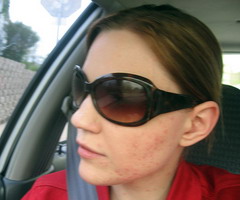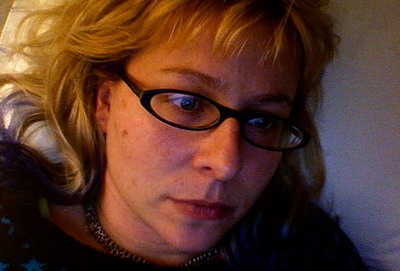Adult Acne
Between twenty and thirty percent of all adults suffer persistent acne, coping not only with the toll it takes on their skin but also with its effects on self-esteem, self-confidence, poise and assertiveness. Many adult acne sufferers also develop social anxiety as a result of their painful self-consciousness about their complexions.
How You Get Adult Acne
Your skin needs natural oils for nourishment and protection, and excessively
dry skin poses almost as many problems as an oily complexion. Even if you maintain a strict cleansing and moisturizing routine, though, your face takes a beating from environmental toxins, pollutants, and pathogens. You may also inadvertently aggravate your skin’s problems by trying to cover or fix them: the wrong make-up traps dirt and oil in pores, and excessive cleaning may rob your complexion of its own natural defenses.
Naturally, stress, caffeine, processed and packaged foods, sodas and fruit drinks, and especially smoking exacerbate acne. Stress changes the balance in your endocrine system, increasing your testosterone levels regardless of your gender, and triggering your body’s production of cortisol, which helps your body horde sugars and fats. More importantly, stress changes your perspiration’s pH, making it an irritant on your skin.
Perspiration can inflame blemishes and slow their healing. Caffeine intensifies the effects of stress, and it especially contributes to oily skin. Sodas and fruit drinks fail to keep you properly hydrated, and they add empty calories to your diet; if your body cannot metabolize those calories, it will store them as fat. New research indicates sub-cutaneous fat accelerates your skin’s oil production. And smoking pollutes your body in every way; but you especially should remember many of cigarette smoke’s toxins accumulate in your hair and get transferred to your skin.
Although acne resists modern medical treatment as stubbornly as any exotic disease, its causes are painfully obvious. Acne develops when natural oil mixes with dirt and dead skin cells, clogging your pores. P. acnes, the bacteria that cause acne, infect clogged pores, causing blemishes and inflammation. During your adolescence, your hormones almost inevitably contributed to your break-outs. Recent Research at The University of Miami suggests hormonal imbalance lies at the root of adult acne. The study indicates that estrogen excess and androgen deficiency make skin more vulnerable to infection. Women often suffer severe acne during pregnancy and the middle stages of peri-menopause—periods of a woman’s life characterized by radical changes in the body’s estrogen/androgen balance. Other carefully monitored studies implicate commonly prescribed medications in cases of adult acne.
How You Fight Adult Acne
Naturally, effective treatment begins with the fundamentals: good cleansing, proper nourishment, and reasonable protection. Physicians believe cover-ups and topical treatments have very little benefit for sufferers of severe acne; and they recommend women carefully choose hypo-allergenic, all-natural make-up…if they must use make-up at all. The experts also advise, whereas some sun exposure provides your skin with much-needed vitamin D and helps reduce excess oil, you always should use nutrient-rich sunscreen.
If common sense, good hygiene, and home remedies have little effect on your acne, consult a dermatologist. A dermatologist has advanced diagnostic and testing tools and protocols, knows the latest research and the most promising treatments.
A number of cable television infomercials and online banners promise miracle results from herbal and nutritional supplements. Although the over-hyped and over-priced products will do you no harm, they generally will do you very little good. Well-informed dermatologists will, however, suggest radical changes in your diet, so that your body can develop its own natural defenses against infection. Building your immune system, you arm all your vital organs against bacterial assault; your skin just coincidentally is the largest part of your immune system.
Most experienced dermatologists will begin your treatment with relatively mild, gentle cleansers and medications. They frequently will defer prescription treatments until you have exhausted your options with over-the-counter products.Cleansers rich in cetaphil and aquanil work well, and lotions rich in salicylic and glycolic acids have proven effective in moderate acne cases. Some doctors will recommend products with retinol, which reduces scars, discoloration, and premature aging. If conservative therapies fail to yield the results you need, your dermatologist will graduate to benzoyl peroxide treatments, and your doctor may suggest peels or light treatments, the most aggressive bacteria-killers.
Because acne results from bacterial infection in clogged pores, most acne remedies reduce excess oil, deep-clean pores, and fight bacteria. The most aggressive remedies change skin’s pH, making it hostile to bacteria, or they treat infection systemically. Some dermatologists prescribe a powerful combination of oral and topical antibiotics, hoping to fight P. acnes wherever it originates. No acne remedy ever has proven 100% effective; dermatologists, biochemists, and pharmacists continue research and clinical trials with a variety of different therapies.
Exercise caution with astringents and abrasives, because they frequently damage healthy skin as they attack dead and infected areas. Exercise similar caution about antibiotics, because they can contribute to frequent yeast infections in women, and some researchers believe over-prescription of antibiotics has triggered growth of drug-resistant P. acnes.
In the last several years, blue-light and LEH therapies have proven safe and effective in clinical trials. Patients like light treatments because they take very little time, can be done in the comfort and privacy of your home, and cost less than protracted courses of prescription drugs.

